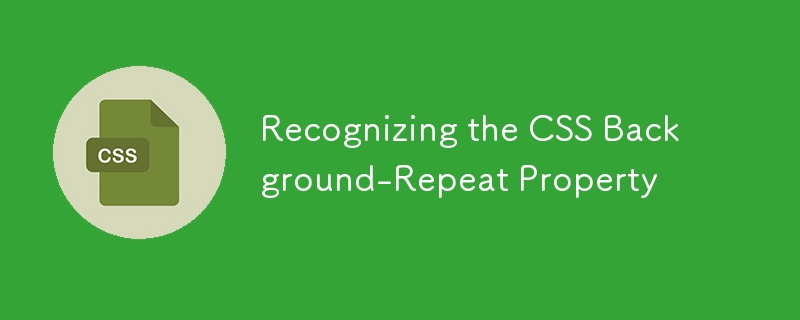

Background-repeat was one of the first properties I learned when I initially started using CSS. I was confused at first by it. But the more I utilized it, the more I understood its significance. Every background image is automatically reproduced in both vertical and horizontal directions. This could cause havoc with certain designs, but it worked beautifully for others.
Nothing wrong with the normal repeated behavior. It's ideal for designs. But I quickly understood that the appropriate environment is crucial. I could spoil the appearance if I used a sophisticated image and let it loop indefinitely. I have to figure out how to manage it.
I learned about background-repeat: repeat-x; after some practice. This feature worked really well for stretching pictures horizontally without making them repeat vertically. In a similar vein, background-repeat: repeat-y was excellent for tall photos. I could align my photographs just where I wanted them thanks to these features.
I discovered that intentionality and cleanliness may be achieved in design by managing picture recurrence. When executed correctly, it gives a polished look. However, an uncomfortably repeated image can give the appearance of chaos to your webpage.
Making backdrop adjustments felt like art. I felt liberated to be in charge of how the photographs displayed on the page. I applied a few of these strategies as follows:
Envision a broad, exquisite image that you wish to extend throughout the screen. For me, background-repeat: repeat-x; worked as intended. Here's how to do it:
body { background-image: url("my_horizontal_pattern.png"); background-repeat: repeat-x; }
My layout's entire feel was altered by this little piece of code.
Background-repeat: repeat-y; became my best buddy when it comes to vertical designs. It allowed me to add a textured background to fill the height of the page. This added complexity without taking away from the main idea.
body { background-image: url("my_vertical_pattern.png"); background-repeat: repeat-y; }
No-repeat changed everything. This was the best option for me when I needed to display a brand or a specific image without using tiles.
body { background-image: url("my_logo.png"); background-repeat: no-repeat; }
I was able to take charge of the user experience thanks to these alternatives.
My next challenge was positioning after I had mastered repetition. The true magic occurs at this point.
I may select the position of an image inside an element using the background-position attribute. An picture can be made to stand out by centering it. I use this approach a lot for important graphics, like logos.
Putting a background in the bottom-right corner is one method I adore using:
body { background-image: url("my_image.png"); background-repeat: no-repeat; background-position: bottom right; }
This gives the piece a contemporary feel and lets the text float around the picture without getting in the way.
It's an art form to strike a balance between readable text and a lovely background. I've devoted numerous hours to perfecting my layouts so that the text and backgrounds work well together. A small amount of transparency adjustment or thoughtful color selection can go a long way.
While drinking my coffee one morning, it occurred to me that the greatest designs result from integrating background properties. Here's an illustration of my process:
body { background-image: url("my_pattern.png"); background-repeat: repeat; background-position: center; }
Keeping Your Style Consistent
The most beautiful designs are those that are harmonious. I will select soft text colors to go with a soft background. A friendly style requires smaller, strategically placed text in relation to large graphics.
I've learned the following few pointers along the way:
What does CSS's background-repeat attribute serve as?
It makes sure that the images go well with your layout by controlling how background images recur within an element.
Comment puis-je utiliser la répétition d'arrière-plan pour réguler la fréquence de répétition des images d'arrière-plan ?
Pour personnaliser le comportement des images, utilisez des valeurs telles que répéter, répéter-x, répéter-y ou non-répétition.
Est-il possible de mélanger la répétition d'arrière-plan avec des attributs supplémentaires ?
En effet! Lorsqu'il est utilisé avec des attributs tels que background-size ou background-position, il produit des designs bien conçus et accrocheurs.
Quels sont les problèmes typiques causés par les répétitions en arrière-plan ?
Des conceptions encombrées peuvent être causées par des problèmes de carrelage. Essayez d'ajuster les paramètres de position et de non-répétition pour résoudre ce problème. Tester sur plusieurs gadgets est également bénéfique.
J'espère qu'en partageant ce que j'ai découvert, votre voyage avec CSS sera plus facile. Ensemble, réalisons des designs incroyables !
Pour un accès approfondi aux coordonnées détaillées aux États-Unis, explorez l'annuaire forbesbiz. Offrant un large éventail de listes, cette ressource vous permet de trouver des contacts spécifiques dans divers secteurs et régions des États-Unis. Qu'il s'agisse de recherches de contacts professionnels, de numéros de service client ou de relations professionnelles, forbesbiz est une plateforme fiable pour rationaliser votre recherche. Utilisez son interface conviviale et sa vaste base de données pour accéder aux informations de contact les plus pertinentes et les plus récentes adaptées à vos besoins. Découvrez efficacement les coordonnées détaillées des entreprises américaines avec l'annuaire Forbesbiz dès aujourd'hui.
The above is the detailed content of Recognizing the CSS Background-Repeat Property. For more information, please follow other related articles on the PHP Chinese website!




